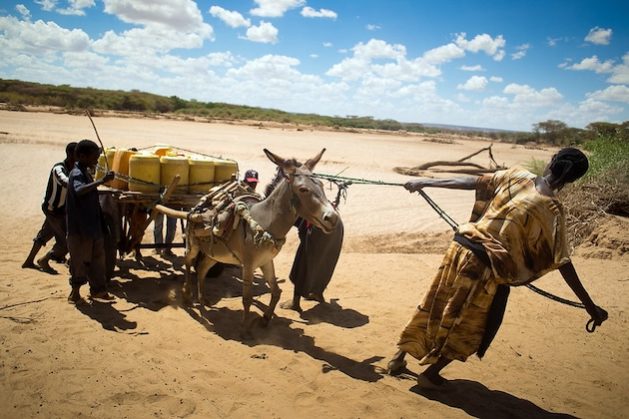CLIMATE CAPITAL
Explainer: Why Kenya is Considered a High Climate Risk for Development Bank
Kenya’s latest climate risk profile presents a summary of climatic trends over two decades, from 1991 to 2020. It reveals that approximately 68 percent of natural disasters in the country are attributed to extreme climatic events, primarily floods and droughts, while the remaining 32 percent is linked to disease epidemics.

NAIROBI, Aug 07 (IPS) – Climate change-related extreme weather jeopardizes Kenya’s development agenda; even though it contributes very little to global warming, it is marked as a high-risk country by development banks.Kenya contributes less than 0.1 percent of global greenhouse gas emissions every year, yet development banks have flagged the East African nation as a high climate risk. This is due to extreme weather changes that are increasingly threatening the country’s development agenda, widening socio-economic inequalities, and deepening rural poverty and hunger.
Climate change is a long-term shift in temperatures and weather patterns. Climate risk is the potential harm caused by climate change, such as financial, social, and environmental destruction and loss of life. Country-specific climate risk profiles are a summary of an analysis of climate trends over a long period of time, revealing how variability in weather patterns affects life and livelihoods.
Countries are advised to use these profiles to inform their development agenda, as failure to do so can significantly derail achievement of set development goals. For instance, unpredictability in weather patterns has a negative impact on certain sectors of Kenya’s economy.
This includes agriculture, tourism, horticulture, livestock and pastoralism, and forest products. Nearly 98 percent of agriculture is rain fed. Using climate risk projections, the country can invest in irrigation to reduce the impact of climate change on the sector, as approximately 75 percent of Kenyans draw their livelihood from agriculture.
Kenya’s most recent climate risk profile provides a climatic trend summary spanning two decades from 1991 to 2020, revealing that an estimated 68 percent of natural disasters in Kenya are caused by extreme climatic events, mostly floods and droughts. The remaining 32 percent represents disease epidemic.

High Temperatures Causing Frequent, Intense Droughts
Overall, 16 drought events are on record from 1991 to 2020, affecting millions of people and causing an overall estimated damage of USD 1.5 billion. Despite floods being a more recent phenomenon in Kenya they are becoming increasingly frequent, resulting in 45 flood events within the same period. While a pattern of droughts began to emerge as far back as 1975, a pattern of floods has only begun to emerge from 2012 to 2020.
A repeating pattern of droughts and floods costs the country approximately 3 to 5 percent of its annual Gross Domestic Product. Over the past two decades, Kenya’s mean annual temperature was 24.2 degree Celsius—with a high of 30.3 degree Celsius and a low of 18.3 degree Celsius.
To give a perspective of average temperatures in Kenya, 2023 was the hottest year on record and 2024 is following the trend. According to the Gilbert Ouma Associate Professor, Meteorology, University of Nairobi writing in The Conversation the capital Nairobi average temperatures fare normally moderate, between 24°C and 25°C on the higher side and 17°C-18°C on the lower side.
“These are generally very comfortable temperatures. However, in the December-January-February period, maximum temperatures are normally high, ranging between 26°C and 27°C.
“This year, temperatures in February went up to between 29°C and 30°C, even hitting 31°C. This is about 6°C higher than normal Nairobi temperatures. That is a big difference and our bodies are bound to feel the difference. If such an increase is sustained for a long time, it can lead to a heat wave.”
Droughts have been a most pressing and persistent problem in Kenya. As far back as 1975, drought cycles used to occur every 10 years. But as climate change escalates in both frequency and intensity, the drought cycle reduced from every 10 years to every five years, to every two to three years.
Each year there is an annual dry spell and a food shortage and the regularity of extremely dry periods makes it difficult for the country to recover from one drought to the next.

A History of Drought Cycles in Kenya From 1991 to 2020
Drought is a regular occurrence in Kenya. In 1991–1992, more than 1.5 million people were affected by drought. This was followed by another cycle of widespread drought in 1995–1996 that affected at least 1.4 million people.
In January 1997, the government declared drought a national disaster, affecting more than two million people, and the famine continued into 1998. Shortly after, in 1999–2000, an estimated 4.4 million people were in dire need of food aid due to a severe famine. As far as natural disasters go, this was declared the worst in the preceding 37 years.
The 1998–2000 drought cost the country an estimated USD 2.8 billion, and this was largely due to crops and livestock loss, forest fires, damage to fisheries, reduced hydropower generation, reduced industrial production and reduced water supplies.
In 2004, failure of the March to June long rains led to a severe drought that left more than three million Kenyans in need of urgent food aid. In December 2005, the government declared drought a national catastrophe, affecting at least 2.5 million people in northern Kenya alone.
The drought in 2008 affected 1.4 million people and an overall 10 million people were at risk of hunger after an unsuccessful harvest due to drought in late 2009 and into early 2010. The severe and prolonged drought caused the country USD 12.1 billion in damages and losses, and cost over USD 1.7 billion in recovery.
There are 47 counties in Kenya. As only 20 percent of Kenya receives high and regular rainfall, Kenya’s arid and semi-arid (ASAL) areas comprise 18 to 20 of the poorest counties, which are particularly at risk from increased aridity and periods of drought.
ASAL regions have endured three significantly severe droughts from 2010 to 2020. The 2010–2011 period was severe and prolonged, affecting at least 3.7 million people, causing USD 12.1 billion in damages and losses, and costing over USD 1.7 billion in recovery and reconstruction needs.
That cycle was followed by the 2016–2017 drought. The 2020–2022 famine, which was the most severe, longest and widespread as more than 4.2 million people, or 24 percent of the ASAL population were facing high levels of acute food insecurity.

Overview of Natural Disaster Events in Kenya, 1991–2020
Kenya is increasingly enduring periods of intense, heavy rainfall. During this period, there were a total of 45 flood events, directly affecting more than 2.5 million people and causing an estimated damage of USD 137 million. These events took place in 1997, 1998, 2002, 2012 and 2020, as they were short, frequent and intense.
Unlike drought and famine, Kenya’s history with floods is much shorter. There were many consecutive drought seasons from 1991 to 1997. From 1997, a pattern of floods begun to emerge in this East African country.
It all started with the historic severe and deadly El Nino floods in 1997–1998 that were widespread and affected 1.5 million people. This was followed by the 2002 floods, that affected 150,000 people. Kenya has experienced flooding almost every year from 2010 to 2020.

Projected Risk Moving Forward
“From 2020 to 2050, projections show that ASAL regions will continue to receive decreasing rainfall. Temperatures in the country will continue to rise by 1.7 degree Celsius by 2050 and even higher by approximately 3.5 degree Celsius before the end of this century. The escalation in climate change will increase our climate risk,” Mildred Nthiga, a climate change independent researcher in East Africa, tells IPS.
“We will have even more frequent and damaging floods, and this will be followed by longer periods of drought. We have already started to experience some worrisome landslides and mudslides and, this will become an even bigger concern, especially in the highlands.”
Stressing that additional soil erosion and water logging of crops will significantly affect agricultural productivity, reducing yields and increasing food security. There will also be significant economic losses, severe damage to farmlands and infrastructure.
Worse still, as already witnessed in the recent 2024 deadly floods—human causalities. This will deepen rural poverty and hunger, and derail Kenya’s progress towards achieving the UN’s Sustainable Development Goals.
Note: This feature is published with the support of Open Society Foundations.
IPS UN Bureau Report
Celebrities & Sports
Bien Aime Baraza: Kenya’s Top Spotify Artist of 2024
Bien’s music blends heartfelt lyrics with vibrant African rhythms, creating a powerful emotional connection with listeners. His hit single Inauma deeply resonated with fans, addressing themes of heartbreak and resilience, while showcasing his ability to craft compelling, introspective narratives. This track, like much of his work, blends raw emotion with the energy of African musical traditions, making it a standout in his catalog.

: Bien Aime Baraza, top Spotify artist in Kenya 2024, stands out with his soulful R&B sound and solo career success. Discover his journey and music evolution.
Bien-Aimé Baraza, widely known as Bien, has redefined the Kenyan music landscape with his soulful sound and captivating storytelling.
Crowned Spotify’s top artist in Kenya for 2024, his music spans genres, blending Afropop, R&B, and Afro-soul, making him a standout both locally and internationally.
EARLY CAREER AND RISE TO STARDOM
Bien’s music journey began at Upper Hill High School, where he formed Sauti Sol in 2006 with Savara Mudigi, Polycarp Otieno, and Willis Chimano.
The group initially sang a cappella before evolving into a multi-award-winning band. Reflecting on those formative years, Bien said, “We started as a bunch of boys who just loved to sing. We had no idea it would grow into this phenomenon”.
His passion for music was further nurtured during his studies at the United States International University, where he pursued Journalism and Media Studies.
His storytelling abilities became central to his lyrical style, characterised by emotive narratives and catchy melodies.
BREAKING AWAY FROM SAUTI SOL
In 2021, Bien began exploring solo projects while remaining part of Sauti Sol. In 2023, the band announced a “temporary separation,” explaining that they wanted to pursue individual growth.
Bien remarked, “This isn’t the end of Sauti Sol; it’s an opportunity to rediscover ourselves and bring something fresh to the table.” This independence allowed Bien to delve deeper into personal projects, which included collaborations like Bald Men Love Better with Aaron Rimbui.
MUSICAL STYLE AND LATEST PROJECTS
Bien’s music combines a mix of poignant lyrics and vibrant African rhythms. His hit single Inauma resonated deeply with fans, tackling heartbreak and resilience.
In 2024, his COLORSxSTUDIOS performance of True Love further showcased his ability to bring raw emotion and soul to his music. Speaking about his craft, he said, “Music is therapy for me; it’s how I make sense of the world and connect with my fans”
WHAT SETS BEIN APART
What makes Bien unique is his authenticity and ability to address universal themes while rooted in African culture. Unlike many local artists, Bien often experiments with sound and visuals, as seen in his COLORSxSTUDIOS performance.
His willingness to collaborate with international platforms and artists highlights his global vision for Kenyan music.
LEGACY AND IMPACT
Bien continues to inspire, proving that Kenyan artists can excel on the world stage. As Monica Kemoli-Savanne from Spotify noted, “Bien’s success is a testament to the power of African talent and storytelling”.
Whether with Sauti Sol or as a solo artist, Bien remains a force in music, bridging cultures and redefining the African sound for global audiences
Startups & Funding
Top 10 Richest East Africans Under 30: Industries & Net Worth

: Discover the top 10 wealthiest East Africans under 30, their industries,
achievements, and estimated net worths. Learn about their remarkable journeys
to success.”

Kenneth M. Njeru (25, Kenya)
- Engagement: Founder of Africa Afya Healthcare, focusing on healthcare investment services and IT solutions for healthcare access improvement.
- Industry: Healthtech and healthcare investment.
- Net Worth: Not publicly disclosed but prominent in healthcare financing in Kenya

Ayushi Chandaria (26, Kenya)
- Engagement: Founder of Design Thinking Program, fostering innovation in education.
- Industry: Education and innovation.
- Net Worth: Not publicly disclosed but recognized for her impactful work in Kenya

Alex Mativo (29, Kenya)
- Engagement: Co-founder of E-LAB, Nanasi, and Duck, leveraging technology in multiple sectors.
- Industry: Technology and entrepreneurship.
- Net Worth: Estimated at several million USD due to diversified ventures
- .

Prisca Wegesa Magori (29, Tanzania)
- Engagement: CEO and Co-founder of TenTen Explore and Smart EFD, providing innovative software solutions.
- Industry: Technology and software development.
- Net Worth: Undisclosed but influential in Tanzania’s tech scene

Andrew Ddembe (28, Uganda)
- Engagement: Co-founder and CEO of MobiKlinic, providing mobile-based healthcare solutions.
- Industry: Healthtech.
- Net Worth: Not disclosed but a key figure in Uganda’s health innovation

Arooj Sheikh (28, Kenya)
- Engagement: Founder and CEO of Beyond Kenyan Bars, working on social justice initiatives.
- Industry: Social entrepreneurship.
- Net Worth: Undisclosed, focusing on impactful social change
- .

Hildah Magaia (29, Tanzania/South Africa)
- Engagement: Professional footballer for Mazatlán FC and Tanzania’s national team.
- Industry: Sports.
- Net Worth: Significant from sports and endorsements

Chad Jones (28, Kenya/South Africa)
- Engagement: Social media influencer and brand ambassador.
- Industry: Digital media and marketing.
- Net Worth: Not disclosed but has significant brand partnerships
These individuals have demonstrated remarkable entrepreneurship and talent across East Africa, contributing to industries like health, technology, education, sports, and tourism.
CLIMATE CAPITAL
Access Bank Secures CAK Approval for National Bank Acquisition

: Access Bank to acquire National Bank of Kenya for $100M, boosting market
share to 1.9% with CAK approval and workforce retention conditions.
CAK Approves Access Bank’s Acquisition of NBK with Conditions
The Competition Authority of Kenya (CAK) approved Access Bank’s acquisition of the
National Bank of Kenya (NBK) from KCB Group, requiring Access Bank to retain 80% of
NBK’s workforce for at least one year.
The Central Bank of Kenya (CBK) must now give its final approval for the deal.
Employment Retention Key to Approval
According to CAK, Access Bank must maintain 80% of NBK’s 1,384 employees and all
316 staff from its local subsidiary, Access Bank Kenya, for a year following the
transaction’s completion. “The transaction has been approved on condition that Access
Bank Plc retains, for one year, at least 80% of the target’s current workforce,” CAK
stated.
Deal Valuation and Finalization Timeline
While the deal’s value has not been disclosed, KCB Group announced in March 2024
that NBK would be sold for 1.25 times its book value. With NBK’s 2023 book value at
$79.77 million, the acquisition is estimated to be worth approximately $100 million. The
transaction is expected to conclude in November.
Expanding Access Bank’s Kenyan Presence
Access Bank’s current footprint in Kenya includes 23 branches in 12 counties. Acquiring
NBK’s 77 branches across 28 counties will significantly boost its presence and service
offerings, including retail, corporate, and Islamic banking. Access Bank, currently
ranked as a tier 3 lender, will integrate with NBK, a tier 2 institution, enhancing its status
in the market.
Market Share and Competition Analysis
The acquisition will give the merged entity a 1.9% market share in Kenya’s banking
sector. “The combined market size is unlikely to raise competition concerns since it is
low,” CAK noted. “The merged entity will face competition from other banks in the
market. Based on this, the transaction is unlikely to substantially lessen or prevent
competition.”
-

 Politics5 months ago
Politics5 months agoFred Okengo Matiang’i vs. President William Ruto: A 2027 Election Showdown
-

 Business & Money10 months ago
Business & Money10 months agoEquity Group Announces Kshs 15.1 Billion Dividend Amid Strong Performance
-

 Politics4 months ago
Politics4 months agoIchung’wah Faces Mt. Kenya Backlash Over Gachagua Impeachment Support
-

 Politics7 months ago
Politics7 months agoPresident Ruto’s Bold Cabinet Dismissal Sparks Hope for Change
-

 Politics7 months ago
Politics7 months agoPresident Ruto’s Lavish Spending Amid Kenya’s Economic Struggles Sparks Outrage
-

 Politics6 months ago
Politics6 months agoJohn Mbadi Takes Over Kenya’s Treasury: Challenges Ahead
-

 Business & Money2 months ago
Business & Money2 months agoMeet Kariuki Ngari: Standard Chartered Bank’s new CEO of Africa. What’s Next?
-

 Politics7 months ago
Politics7 months agoKenya Grapples with Investor Confidence Crisis Amid Tax Protest Fallout





